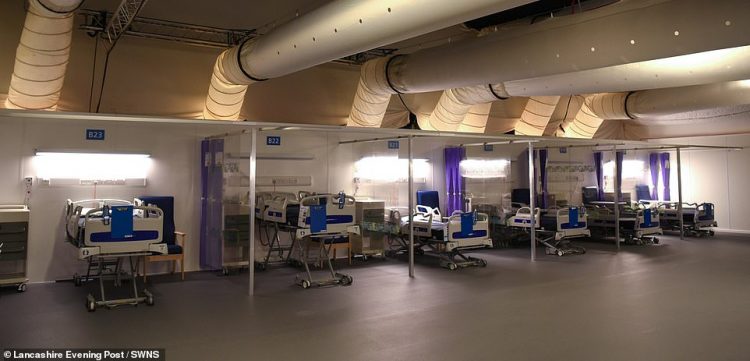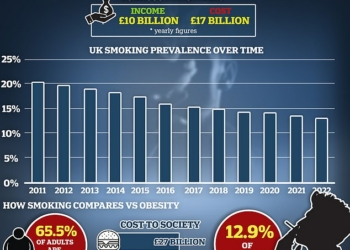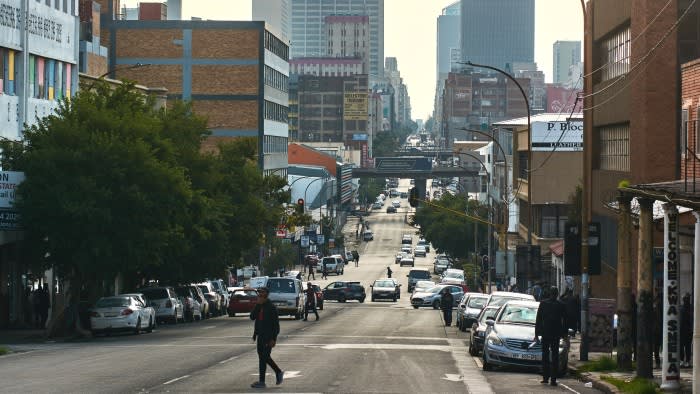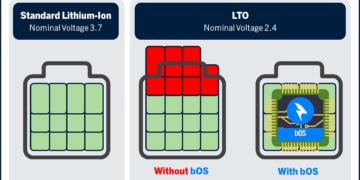This is the first look inside one of the NHS’ new Nightingale surge hubs — which officials concede might never be used as the Omicron wave continues to recede.
The temporary site on the grounds of Royal Preston Hospital is one of eight commissioned across England last month, when the fourth wave looked as if it could threaten the health service.
It has been assembled in the car park at the city’s biggest hospital in less than four weeks and can house roughly 100 Covid patients — but it is currently empty.
Local NHS bosses have indicated that the new hub might never be used and medical unions have warned it could swallow up staff and pull resources away from other parts of the health service.
Other make-shift structures are being built in London, Leeds, Solihull, Leicester, Stevenage, Ashford and Bristol for an undisclosed amount of money.
England’s original Nightingale hospitals, built in 2020, cost a total of £500million, which included running costs, stand-by costs and decommissioning costs. But they saw only light use before being mothballed.
The new, smaller sites will remain on standby to look after Covid sufferers who are not well enough to go home but need minimal supervision during their recovery.
Kevin McGee, chief executive of Lancashire Teaching Hospitals Trust which looks after the Royal Preston, previously said : ‘My hope is that we never have to use it.
‘We’re planning for it, and that’s quite right because we need to make sure that we put the appropriate capacity in place should we need it, but I’m hopeful we can manage within our core bed base.’
However, Dr Brian McGregor, of the British Medical Association (BMA), said staffing more beds would mean ‘falling further behind’ on routine work.
It comes as figures show the majority of Covid patients in English hospitals are not primarily being treated for the virus for the first time in the pandemic – thanks to the super-mild Omicron variant.
As few as a third of inpatients are mainly sick with the virus in parts of the country, with the rest primarily receiving care for a range of other conditions, such as a broken leg or heart disease.

The Nightingale Surge Hub at Royal Preston Hospital, one of eight makeshift wards at hospitals across England, has 100 beds for patients from across the North West

The Nightingale facilities – manned by a mix of hospital consultants, nurses, and other clinical and non-clinical staff – are designed to take patients who, although not fit for discharge, need minimal support and monitoring while they recover. Pictured: The Nightingale Surge Hub at Royal Preston Hospital

Local NHS bosses have indicated that the new hub at Royal Preston Hospital (pictured) might never be used and medical unions have warned they could swallow up staff and pull resources away from other parts of the health service

Other structures are being built in Leeds, Solihull, Leicester, Stevenage, London, Ashford and Bristol for an undisclosed amount of money. Pictured: the Nightingale Surge Hub at Royal Preston Hospital

England’s seven original Nightingale hospitals built in 2020 cost the taxpayer more than £500million, which included running costs, stand-by costs and decommissioning costs. But they only treated a handful of patients. Pictured: the Nightingale Surge Hub at Royal Preston Hospital

The new, much smaller, sites can only house 100 or so patients each and will remain on standby to look after Covid sufferers who are not well enough to go home but need minimal supervision during their recovery. Pictured: the Nightingale Surge Hub at Royal Preston Hospital

A glimpse of the site from the outside. The makeshift facility is built in one of the hospital’s car parks
Criticising the new surge hubs earlier this month, Dr McGregor, from the BMA’s Yorkshire Regional Council, told the BBC: ‘Each bed takes two to three staff to run it 24/7.
‘The workforce that can work is working and how we cover staffing of these units is going to be the most important part, because you’re going to be taking staff away from other pathways and other workload.
‘So we’re going to find ourselves falling further behind on our routine work.’
The comments come amid growing acceptance that Covid will not put the NHS under significant pressure this winter.
Latest figures show there were 1,651 new Covid patients admitted to English hospitals on January 23, which was down 13 per cent on the previous week. UK-wide admissions have fallen for nearly two weeks straight.
That’s compared to nearly 4,000 at the peak of the second wave this time last year.

Latest figures show there were 1,651 new Covid patients admitted to English hospitals on January 23, which was down 13 per cent on the previous week. UK-wide admissions have fallen for nearly two weeks straight. Pictured: the Nightingale Surge Hub at Royal Preston Hospital

Criticising the new surge hubs earlier this month, Dr McGregor, from the BMA’s Yorkshire Regional Council, told the BBC: ‘Each bed takes two to three staff to run it 24/7. ‘The workforce that can work is working and how we cover staffing of these units is going to be the most important part, because you’re going to be taking staff away from other pathways and other workload. ‘So we’re going to find ourselves falling further behind on our routine work.’ Pictured: staff at the Nightingale Surge Hub at Royal Preston Hospital

Pictured: staff at the Nightingale Surge Hub at Royal Preston Hospital

Pictured: staff at the Nightingale Surge Hub at Royal Preston Hospital




NHS England data shows the percentage of Covid patients in hospitals in England’s seven regions who are not primarily being treated for the virus (left), while the graphs (right) show how this rate has changed over time. The North East had the highest proportion of patients (57.4 per cent) who are mainly being treated for other ailments

NHS England data shows the majority of Covid patients in English hospitals are not primarily being treated for the virus for the first time in the pandemic. The share of primary Covid patients has plummeted since the emergence of the super-mild Omicron variant in late November, when three-quarters of inpatients were mainly ill with the disease

NHS England data shows there were 13,023 Covid patients in hospital on Tuesday (January 25), of which only 6,256 were primarily there for the virus, or 48 per cent
Meanwhile, the mild – but highly infectious – Omicron variant is causing more ‘incidental’ hospital cases.
There were 13,023 Covid patients in hospital on January 25, according to the latest NHS England figures, of which only 6,256 were primarily there for the virus (48 per cent).
This share has plummeted since the emergence of the super-mild Omicron variant in late November, when three-quarters of inpatients were mainly ill with the disease.
Just three of England’s seven NHS regions have more primary Covid patients than incidentals — the North West (57 per cent), South East (55 per cent) and the North East and Yorkshire (54 per cent).
Little over a third of inpatients are primary Covid in London (36 per cent) and the East of England (38 per cent), while in the Midlands and the South West the proportion is 46 and 49 per cent, respectively.
Hospital patients who test positive for Covid need to be isolated from those who do not have the virus, regardless of whether they are in hospital primarily for Covid or not.
Non-primary Covid patients include those who catch Covid while in hospital for a different illness and those who are admitted for another reason and happen to be incubating the virus as they arrive.















